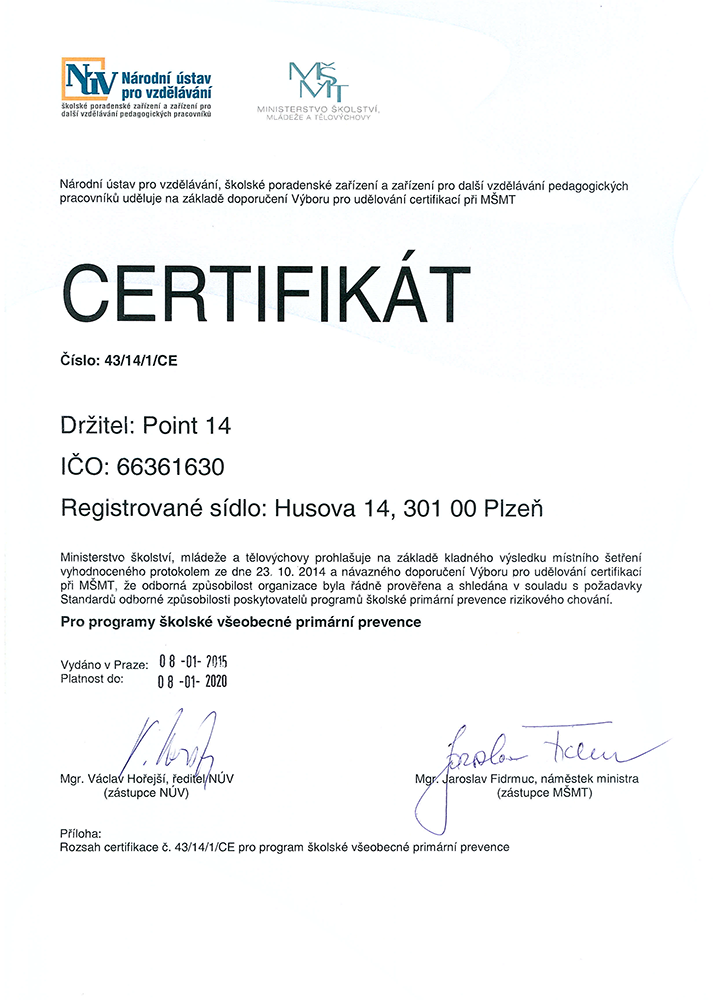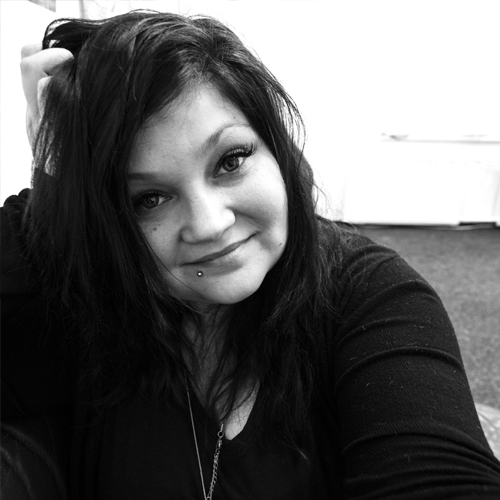Primary prevention
Mission
The mission of primary prevention is to provide young people objective information about drug addiction and its possible causes, to create a safe room for expressing one's own emotions and opinions, to strengthen communication skills, and to learn coping with peer pressure in the group, thereby preventing the formation and development of addictions.
The service is certified - Certificate of professional competence No. 43/14/1 / CE granted by the Ministry of Education, Youth and Sports for a period of five years is valid until 8.1.2020.

The organization implements several programs divided by the target group:
PThe project "Prevention and Reducing Tension" for pupils of the 9th grades of elementary schools and the fourth 4th grade of grammar schools
The target of the project is to prevent or delay the first use of an addictive substance, to prevent other hazardous behavior and to prevent its development by providing balanced information from the field of substance abusement and other risky behaviors, supporting and preserving negative attitudes of students to addictive substances, adopting healthy lifestyle so they can benefit from gained information and experience not only during the program but also in the future.
It consists of 4 meetings during one school year:
PP I (2 lessons) - Basic information from the field of drug problematics
The goal of this bloc is to acquire the knowledge and skills supporting and reinforcing anti-drug attitudes,
preventing or at least delaying contact with addictive substance by clarifying the images spreaded with unrealistic
stories and expanding the students' orientation in the field of drug issues by adding information and linking the context.
PP II (2 lessons) - Group work focused on students' topics
The goal of this bloc is to broaden the stundets' orientation in the topics of risky behavior that the students are
interested in, to add and link the contexts of risky behavior with the field of addictive substance and the orientation
in the basic issues of healthy lifestyle and their use in everyday life by enhancing positive attitudes towards
their own health.
PP III (3 lessons) - Group work focused on preventing bullying and other forms of abuse
The goal of this bloc is to promote positive relationships in the classroom and to prevent the emergence of bullying
in secondary schools, specialized scholls or other colleges after graduation at elementary school, to realize their
own role in the collective and to prevent the transfer of changed roles to a new enviroment by approaching to the
feelings of aggressors, victims and witnesses of bullying and the ability to defend themselves pressure,
manipulation and eventually the ability to deal with the situation.
PP IV (3 lessons) - Group work focused on communication skills and abilities
The goal of the bloc is to acquire and application skills in effective communication
(especially assertive rejection, constructive critisism and conflict resolution) by introducing of the
basics of communication, including assertive skills and interpersonal conflicts, the orientations in the
subject and the emotions associated with it, the role of self-confidence in communication and searching
context of the topic with risky behavior to the students.
Long-term program of specific primary prevention for 1st year students of specialized schools (secondary vocational school):
The goal of the project is to strengthen and improve the students' anti-drug attitude and prevent the development of addiction on addictive substances by linking and covering the context up, enhancing the ability to express their opinion, thereby face the pressure of peers, supported by the ability to identify the causes of addiction and prevent them by applying a healthy lifestyle.
It consists of 3 meetings during one school year:
PP I (2 lessons) - Basic information from the field of drug issues
The goal of the bloc is to strengthen the anti-drug attitude by covering and linking the contexts
of substance abuse issues and clarifying the image of the effects and risks of addictive substances
arising from spreading of unrealistic stories.
PP II (2 lessons) - Causes of addiction
The goal of the bloc is to focus on the feelings and situations prior to the occurrence of addiction,
to prevent them by applying the principles of healthy lifestyle in everyday life and to prevent the
formation or development of adiction of studets' by their ability to orient themselves in their own
feelings and their ability to solve openly the difficult situations with their close relatives, friends or specialized institution.
PP III (3 lessons) - Resisting peer pressure
The goal of the bloc is to strengthen the students' ability to express and defend their opinion and anti-drug attitudes
to addictive substances by orientation in their own strengths and weaknesses and self-confidence in resisting peer pressure.
Educational seminar for pedagogues (90 minutes)
Educational seminars for pedagogues are focused on providing basic information about drugs and addictions
(outline of addictions, drugs' goups and types, drug effects), and overcoming myths and prejudices.
The seminars are interactive and they also include answers to specific questions from teachers.
Seminars can also be focused on a particular topic chosen by the client - if it is the competence of
the lecturers (according to the training of the lecturers).
The goal of this project is to provide to educators objective information about the use of addictive
substances, overcome myths and prejudices about addictive substances, provide information about options
for solving a drug issue and about helping organizations, and forward information about what to do and
not do if a student uses adictive substances.
Individual counseling
The counseling is provided free of charge, it can be used by teenagers aged 14-18 or parents. It takes place at Point 14 in a pre-arranged term and can be focused at any area of socially undesirable phenomena that may lead to substance abuse.
Price list:
- Program for elemetray school: 2500 CZK / 1 class / 1 school year (4 meetings)
- Program for specialized school: 2000 CZK / 1 class / 1 school year (3 meetings)
- Educational seminar for pedagogues: 1500 CZK/90 minutes
-
Price for schools out of Pilsen:
3000 CZK + travel expenses / 1 class / 1 school year (4 meetings)
2500 CZK + travel expenses / 1 class / 1 school year (3 meetings)
Selective primary prevention
These prevention is suitable for pupils of secondary school and grammar school. It's focused on how to safely use cyberspace and virtual drugs in group of pupils that can be threatened by this issue. The condition for using the prevention program is to describe the situation in a particular class - why is it threatened by the risk behaviors that the program focuses on:
Safe use of cyberspace
The program consists of 3 meetings (2-3 lessons for one meeting) at 3-week interval. It focuses on the safe handling of the Internet, social networks, media informations and on the risks associated with virtual communication and cyberspace (eg. cyberbullying).
Selektive primary prevention is provided for free.
Supporting Group for Children and Juveniles
The aim of the project is to support children and adolescents in social inclusion into peer groups and to acquire skills to sustain the project in the future.
Partial goals:
- Creating a safe space for communication
- Positive experience with the peer group
- Strengthening social skills
- Promoting healthy self-confidence
- Fix positive thinking about oneself and the others
The project introduces an open peer group for children and juveniles aged 12-16 - children and juveniles who, for whatever reason, have difficulty engaging in collectives, establish relationships.That's why they can be victims of bullying and threatened by pathological behavior. The group is suitable for passive individuals who need support for healthy self-esteem and practice of communication and other social skills.
The support group is a closed group for a maximum of ten children and adolescents and consists of 10 meetings that take place 1-2 times a week (according to the group's current needs) in the afternoon. It is a growth group - prevention, not therapy.
Children and adolescents are included in the group on the recommendation of a specialized facility (PPP Plzeň, psychiatric / therapeutic facilities, school facilities, etc.) which describe why certain person needs to be included to support group. Legal representatives have to agree with inclusion their sun/daughter to this group.
Support group is provided for free.
Primary prevetion team
Lecturers: Mgr. Aneta Rothová
Jana Jindrová
Bc. David Charvát
Mgr. Michaela Hlavová
Supervisor: Mgr. Jan Betlach
